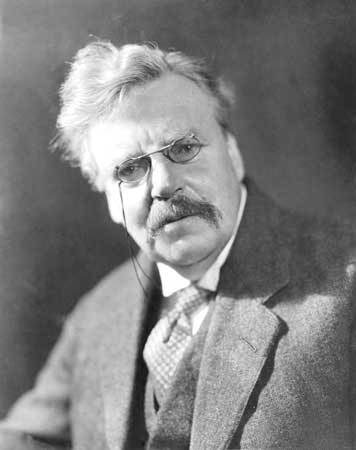For where your treasure is, there your heart will be also (Luke 12:34).

G. K. Chesterton (+1936)
The author G.K. Chesterton, a celebrated convert to Roman Catholicism, once wrote a book explaining his rediscovery of Christianity. He published it in 1908, an era of growing scepticism and, to his mind, a time when reason as an approach to human experience was becoming the only respectable one. He observed that there were many in his own day who believed (and it was, for them, a matter of faith) that the power of the human mind was inflexible and, given enough clear thought, we could solve any philosophical problem. The book in question is called Orthodoxy – a title not to be confused with our exact use of the word as Eastern Orthodox Christians. Nevertheless, he uses the title, inviting his readers to rediscover a now-lost world of faith. Near the start of the book he refers to the delightful image of a man setting out in a boat from Britain to bring enlightenment and reason to primitive peoples. He comes at last to land and finds what he takes to be one of their exotic temples. However, he soon discovers that he is such a poor navigator that he has, in fact, landed in the British south coast town of Brighton and is standing before the famous Brighton Pavilion. He has ‘discovered’ his own homeland. The point that Chesterton makes is that he was that man and that what he rediscovered was the Christian faith. His book, Orthodoxy, invites his readers, of course, to do the very same thing.
Early on in the book there is a clearly written critique of the merely rational approach to life and knowledge. That approach, born of the eighteenth-century Enlightenment, became the rationalism of Chesterton’s modern world and has now been transformed into the aggressive atheism of our own post-modern times. Chesterton deals head-on with those who attack the mystical imagination of, for example, the poet. He counters the idea that such imagination leads to madness by pointing out that it is chess-players and mathematicians and cashiers who go mad, but creative artists and poets very seldom do. He writes: ‘Poetry is sane because it floats easily in an infinite sea; reason seeks to cross the infinite sea and so make it finite… The poet only asks to get his head into the heavens. It is the logician who seeks to get the heavens into his head. And it is his head that splits.’
This has great implications for us as Orthodox believers living in the times that we do. Our faith is rooted in our hearts first, not our heads. Orthodox Christianity is truly a faith of the heart. I am, of course, using the word ‘heart’ in the biblical sense as the centre of the self – not, as is frequently misunderstood, the seat of the emotions. The aim of our spiritual endeavour in Orthodox Christianity, especially during the Great Fast, is to root our prayer – our conversation with God – in the heart. The spiritual fathers whose words are recorded in the spiritual classic, The Philokalia, spoke of the mind being brought down into the heart. Prayer is one of the three Lenten disciplines, alongside fasting and almsgiving. As we consider and re-evaluate the quality of our own life of prayer at this time, I should like to consider a few thoughts on developing our participation in this activity that lies at the very heart of our conversation and relationship with God. Using Chesterton’s basic idea that the heart, not the intellect, is our primary reference point, I should like to invite the reader to consider how we might enhance not only our commitment to this practice, but also how we might deepen the very experience itself.
We always start, of course, at the level of verbal prayer. We can participate in liturgical services: where two or three are gathered in My name, there am I in the midst of them, as Our Lord said (Matthew 18:20). Or we offer our prayers alone: something all Orthodox Christians should do in addition to our liturgical participation in the Body of Christ, for this basic level of prayer is the default position for any meaningful relationship with God. Without it, the hearty grows cold. It will entail, as well, the reading of the Scriptures. The reciting of prayer-texts, such as psalms when we are alone, also falls into this category. Performed as a salutary and needful rule, the recitation of prayer-texts is not to be the vain and empty repetition of mere words, as if God required us to send up a set quota of verbiage in a heavenly direction every day. Even at this very basic level, we are called to pray with attention. For most of us, the mercurial nature of the mind, the very busyness of the brain, threatens constant distraction from the background ‘noise’ of interrupting thoughts. Here we should aim to use our mental capacity to ponder upon and engage with the words we are reciting. Ideally all verbal prayer should fix at least upon comprehension, otherwise we shall be in danger of lapsing into those wandering thoughts, whilst merely giving voice to mindless sounds and not engaging with God at all.

But when the mind, through the active grace of God, steps beyond the verbal into silent, mental prayer, we are drawn inward, eventually descending, if so blessed, into the heart. There we meet and converse with God at the point where the soul stands in awed silence before the One in Whose image we are created. Here we begin to acquire a transforming knowledge that the mind, the head, can never ‘work out,’ no matter how clever we are at theology. The true theologian is one who discourses on God from the heart, not with the head, from his experience and knowledge of God. Even in writing this, my descriptive words must fail to do justice to my theme, for these affairs can only be experienced, not described, like those hymns of praise that frankly confess that words cannot express the glory of God. Chesterton was clearly right: the head must strive to reach heaven (through the heart); heaven cannot be contained within the head. Carlo Caretto, a Roman Catholic monk, once wrote that he had no time for theologians who do not pray. Truly, one who prays is a theologian, for he discourses with God and of the things of God.
This approach to our faith is essential if we are to have any appreciation of its transforming power. St. Theophan the Recluse wrote of conversion as turning the heart to God. Moreover, the great Russian theologian, Vladimir Lossky, wrote of the Orthodox understanding of Christianity as being, at root, mystical. To the western mind this might appear obscure, a ‘smoke and mirrors’ trick to avoid realism. Whereas, in the extreme case, one pursues a rigorous logic, confining theology to the finite talent of the human mind alone, the other is founded on genuine mystical and spiritual experience, the pondering of the heart. This is first borne witness to in the Scriptures themselves, where St. Luke records that Our Lady pondered the mysteries she had experienced in her heart (Luke 2:19).
This is particularly relevant as we journey through the Great Fast to the coming feast of Our Lord’s Resurrection. How does the mind deal with the idea of the fulfilment of the visions of the Prophets or the freely undergone humiliation and suffering of God Incarnate, let alone the power of Christ’s Resurrection? How could Christ have been in the tomb with the body but in paradise with the thief; in Hades among the dead and on the throne with the Father and the Spirit? The same can be applied to the Incarnation and the dual nature of the God-Man, as well as to the mystery of the very Trinity and the inner relationships between the Divine Persons and the Divine Nature. How can one embrace all this theological ‘poetry’ that cannot possibly be conceived within the boundaries of the human mind? The answer to such mysteries can only be to stand in awed and reverential silence ‘in the heart’ and to wonder.
Having retreated into the desert for these holy forty days, we can at least try to fix our hearts once again on striving to submit ourselves to a wholesome, ascetic, and spiritual discipline: the body through fasting, the heart through prayer, and the soul bearing the fruit of selfless charity. All three are important. As has often been remarked, the fast without prayer is just a diet. Worse still, prayer without charity is hypocrisy.
So let us plunge once again into the Lenten fast. Even if you have made only a desultory beginning, now is the time to turn it around. Yes, we might rely on those generous words heard at the Paschal Vigil, when the Catechetical Homily of St. John Chrysostom is read, inviting to the feast even those who have come at the eleventh hour. But the spiritual rewards of entering now and continuing faithfully to the end are immeasurable. Our Christian life during the fast is not rooted in the mere application of rules, essential as these are as guiding rails. We must start by freeing ourselves from what we used to be though repentance and confession. We must attend as many of the liturgical services as we are able, listening intently to the words of the hymns and the message of the Holy Scriptures. And we must pray with attention, for in a strange and marvellous process, the more we focus on the meaning of what we might read and say from the text, the greater we are able to hear its transforming message: in attending to what we are saying, we are open for God to speak to us. As far as we are able, given our individual circumstances, we need to hold this endeavour as the most important concern in our lives.
Yes, we might think that there are pressing affairs to deal with in daily life: work, deadlines, appointments, obligations, family duties – and all of them can be attended to as necessary. But what, in the end, is of greater priority than the health of our eternal souls? Think of the anxiety we expend on our physical health and wellbeing. What if we were as solicitous for our souls? For a time, then, let us seek to enter in spirit the desert in which Christ dwelt and, with a silencing of the feverish mind, rediscover in our own hearts, rather like Chesterton’s wayward navigator, none other than the way back to paradise.

















